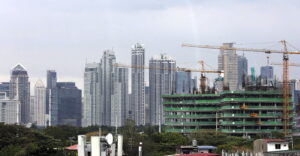Philippine Bank of Communications (PBCom) is raising P2 billion from the debt market to support the growth of its loan portfolio as interest rates begin declining.
In a stock exchange filing on Monday, billionaire Lucio Co-led PBCom said its maiden peso bond issuance would run from Oct. 14 to Oct. 28.
The bonds, which will mature in one and a half years, promise a yield of 6.0796 percent per annum. The offer is part of the bank’s P15-billion bond program approved in March.
PBCom will upsize the offering in case of high demand.
Listing on the Philippine Dealing and Exchange Corp. (PDEx) is expected on Nov. 5.
“Proceeds from this bond issuance will be utilized for general corporate purposes, including refinancing debt obligations, diversifying funding sources and supporting loan growth,” PBCom said.
ING Bank NV Manila Branch was tapped as the sole arranger and bookrunner, while both PBCom and ING will be the selling agents. Development Bank of the Philippines-Trust Banking Group was appointed trustee for the deal.
PBCom’s bond issuance comes as the Bangko Sentral ng Pilipinas (BSP) is expected to slash the benchmark interest rate of banks by 25 basis points to 6 percent.
Should the BSP ease its monetary policy further during its Oct. 16 meeting, this will make existing bonds—such as PBCom’s—more attractive to investors due to its higher yield.
The PDEx has so far seen at least P266.4 billion worth of domestic bonds this year. The bond platform aims to reach P400 billion by the end of the year, nearly doubling last year’s P209-billion total.
PBCom’s total assets reached P148.7 billion as of June, up by 12.2 percent.
In the first semester, its earnings inched up by 2.81 percent to P1.03 billion as its loan portfolio grew. Growth was tempered by higher operating expenses, PBCom said in a financial filing.
Net interest income expanded by 13.85 percent to P2.63 billion, driven by an increase in service charges, fees and commissions.
PBCom was one of three Philippine companies recognized in Forbes Magazine’s 2024 list of 200 “Best Under A Billion” publicly traded companies in the Asia-Pacific for posting robust growth despite high inflation across the globe.


